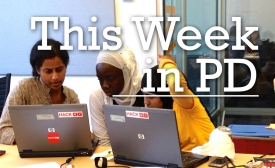social media
Digital platforms are enabling an era of digital diplomacy – but, says British High Commissioner to Ghana Jon Benjamin, there are certain rules of the game that need to be taken into account. [...] But here’s something different that touches on both aspects, but is itself a discipline in its own right – diplomacy in the digital age.
After trying many ways to confront ISIS’ campaigns on the internet to recruit Westerners, in particular Americans, the U.S. State Department launched a program that seeks “to appeal to emotion rather than logic” as The New York Times said on Friday. “Daesh deprives a woman of her voice,” reads one image that is part of a new State Department program, using the Arabic acronym for ISIS.

Explore the intersection of digital media and public diplomacy in this PD News roundup.
The Obama administration has revamped a program designed to lure foreign fighters away from extremist groups like the Islamic State, focusing on a series of new advertisements and social media posts that seek to appeal to emotion rather than logic. Money for the program, which is managed by the State Department’s Global Engagement Center, tripled this year, to $16 million, after administration officials concluded that past efforts that had attempted to scare potential militants away from the extremist groups were not working.
In the age of digital diplomacy, governments often turn to social media following a crisis, be it a terror attack or natural disaster. Social media may be used by governments in order to comment on crises as they develop, offer a narrative of events and demonstrate that the government is functioning and attempting to regain control of the situation.
Wouldn’t it be great if your government owned the English name of your country on Twitter? You could proudly @mention your country or support your national team with a tweet. Today all English-language country names have been registered on Twitter; however, only 23 governments and state tourism boards have secured their English-language country name on Twitter, up from only nine, four years ago.
Digital sites like La Pública in Bolivia, El Pitazo in Venezuela and global site Rising Voices are establishing relationships with low-income, rural and indigenous communities. The idea is to produce their own news agendas different from those of traditional media. The sites give voice to community problems and support the creation of media that come from the communities.







